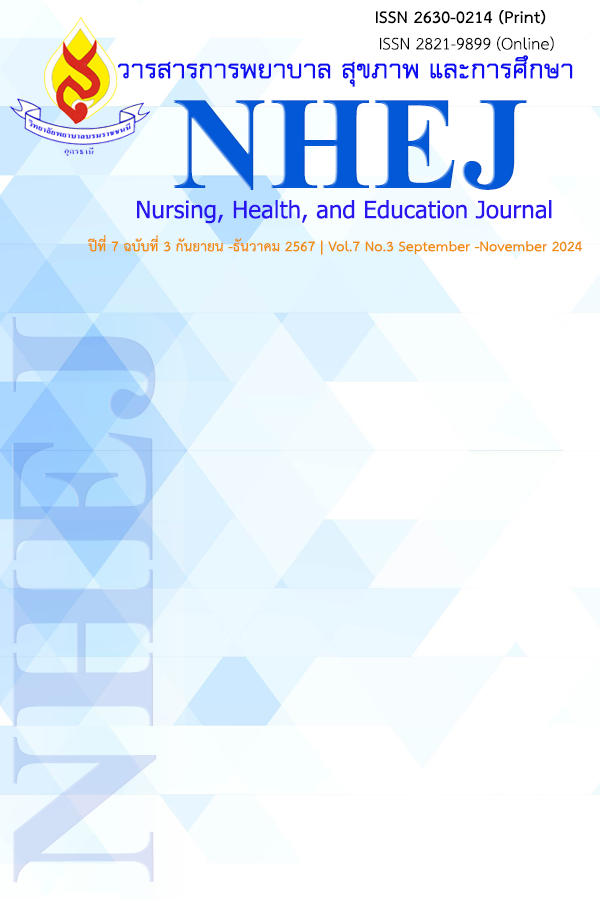Sleep quality and factors related to sleep quality of nursing students
Abstract
Introduction: Good sleep quality in nursing students will improve their analytical thinking, performance, learning processes, and efficiency.
Objective: To examine sleep quality and factors related to sleep quality in nursing students at Boromarajonani College of Nursing Sawanpracharak Nakhonsawan.
Research methodology: The sample consisted of 268 students from the Bachelor of Nursing Program in the 1st-4th year of the academic year 2024 by stratified random sampling. Data were collected by questionnaires consisting of personal data, Pittsburgh Sleep Quality Questionnaire, Stress Questionnaire, Perceived Environmental Disturbances Questionnaire, Sleep Habits Questionnaire, Social Media Use Questionnaire, and Workload Questionnaire. The content validity of the instruments was tested by experts and the reliability was tested by Cronbach's Alpha Coefficient with reliability values of .80, .80, .82, .83, .83, and .81, respectively. Data were analyzed using descriptive statistics and Spearman rank correlation.
Results: Results revealed that the sample was female (93.3%), 28.0% were in their first year, had a GPA between 3.01-3.50 (32.10%), and reported poor sleep quality of 52.40%. The significant factors related to sleep quality were stress, perception of environmental disturbance, social media use, workload, and sleep habits There was a statistically significant relationship with sleep quality (rs = .467 p < .001; rs = .254 p < .001; rs = .238 p < .001; rs = .294 p < .001; rs = .361 p < .001, respectively). The academic year and cumulative grade point average were not statistically significantly related to sleep quality.
Conclusion: Most nursing students had poor sleep quality, and stress, perceived environmental disturbance, social media use, workload, and sleep habits were statistically significantly related to sleep quality.
Recommendations: Educational institutions should focus on promoting good sleep habits, providing care and support for mental health problems, and workload, and providing an environment conducive to proper sleep for nursing students.
Keywords: Sleep quality, Nursing students
References
Watson NF, Badr MS, Belenky G, Bliwise DL, Buxton OM, Buysse D, et al. Recommended amount of sleep for a healthy adult: a joint consensus statement of the American Academy of Sleep Medicine and Sleep Research Society. J Clin Sleep Med. 2015;11(6):591-2. doi: https://doi.org/10.5664/jcsm.4758
Galván-Molina JF, Jiménez-Capdeville ME, Hernández-Mata JM, Arellano-Cano JR. Sistema de tamizaje de psicopatología en estudiantes de Medicina [Psychopathology screening in medical school students]. Gac Med Mex. 2017;153(1):75-87.
Bartlett ML, Taylor H, Nelson JD. Comparison of mental health characteristics and stress between baccalaureate nursing students and non-nursing students. J Nurs Educ. 2016;55(2):87–90. doi: https://doi.org/10.3928/01484834-20160114-05
จิราภรณ์ นันท์ชัย, นริศรา ใคร้ศรี, ลาวัลย์ สมบูรณ์, เทียมศร ทองสวัสดิ์. ปัจจัยทำนายคุณภาพการนอนหลับของนักศึกษาพยาบาล. Nursing Journal. 2017;44(พิเศษ):49-59.
Santos TC, Martino MM, Sonati JG, Faria ALD, Nascimento EF. Sleep quality and chronotype of nursing students. Acta Paulista de Enfermagem. 2016;29(6):658-63.
Butsathon N, Luvira V, Nonjui P, Deenok P, Aunruean W. Sleep pattern among students in Khon Kaen university. Srinagarind Med J. 2020;35(3):332-9.
Asawa K, Sen N, Bhat N, Tak M, Sultane P, Mandal A. Influence of sleep disturbance, fatigue, vitality on oral health and academic performance in Indian dental students. Clujul Med. 2017;90:333-43.
กรมสุขภาพจิต. เจาะลึกภาวะ Burnout Syndrome วิธีแก้และกิจกรรมที่จะช่วยเติมพลังในตัวคุณ. [อินเทอร์เน็ต]. 2563 [เข้าถึงเมื่อ 8 กันยายน 2563]. เข้าถึงได้จาก:
https://www.ryt9.com/s/iqml/3085580
Spielman AJ. Assessment of insomnia. Clin Psychol Rev. 1986;6(1):11-25.
Albasheer OB, et al. Prevalence of insomnia and relationship with depression, anxiety, and stress among Jazan University students: A cross-sectional study. Cogent Psychology. 2020;7(1). doi: https://doi.org/10.1080/23311908.2020.1789424
Wang Y, Xiao H, Zhang X, Wang L. The role of active coping in the relationship between learning burnout and sleep quality among college students in China. Front Psychol. 2020;11:647. doi: https://doi.org/10.3389/fpsyg.2020.00647
Gunes Z, Arslantas H. Insomnia in nursing students and related factors: A cross-sectional study. Int J Nurs Pract. 2017;23(5):e12578.
Buysse DJ, Reynolds CF, Monk TH, Berman SR, Kupfer DJ. The Pittsburgh Sleep Quality Index: a new instrument for psychiatric practice and research. Psychiatry Res. 1989;28(2):193-213.
Ravi RK, Mohamed MG. Well-being among nursing students: Relationship between lifestyle behaviours, sleep quality and resilience. Afr J Nurs Midwifery. 2022;24(3):1-7.
สาวิตรี พลเยี่ยม, เทพไทย โชติชัย. ปัจจัยที่มีความสัมพันธ์กับคุณภาพการนอนหลับของนักศึกษาวิทยาลัย การสาธารณสุขสิรินธร จังหวัดขอนแก่น. ว. วิทยาศาสตร์สุขภาพและการสาธารณสุขชุมชน. 2563;4(2):33-44.
Salvi CP, Mendes SS, Martino MM. Profile of nursing students: quality of life, sleep and eating habits. Rev Bras Enferm. 2020;73:e20190365.
Mohammadbeigi A, et al. Sleep quality in medical students: The impact of overuse of mobile cell-phone and social networks. J Res Health Sci [Internet]. 2016 [cited 2018 Sep 18];16(1):46-50. Available from: http://jrhs.umsha.ac.ir/index.php/JRHS/article/view/2484/pdf
ธิติมา ณรงค์ศักดิ์, ฐิติมา สงวนวิชัยกุล, วรพงศ์ ตรีสิทธิวนิช. การนอนหลับและสุขอนามัยการนอนหลับ. ว. สถาบันจิตเวชศาสตร์สมเด็จเจ้าพระยา. 2563;14(2):69-85.
กาญจนา อยู่เจริญสุข. ปัจจัยที่มีความสัมพันธ์กับคุณภาพการนอนหลับของนักศึกษาพยาบาลศาสตร์มหาวิทยาลัยราชธานี. ว. ราชธานีนวัตกรรมทางวิทยาศาสตร์สุขภาพ. 2561;2(1):37-47.
นาฎนภา อารยะศิลปธร, พัชนี สมกำลัง, จันทร์จิรา ภูบุญเอิบ. ปัจจัยที่มีผลต่อคุณภาพการนอนหลับของนักศึกษาพยาบาลในวิทยาลัยพยาบาลแห่งหนึ่ง. ว. วิทยาลัยพยาบาลพระปกเกล้าจันทบุรี. 2560;28(1):38-50.
นาตยา ดวงประทุม. ปัจจัยที่มีความสัมพันธ์กับคุณภาพการนอนหลับของนักศึกษามหาวิทยาลัยราชภัฏ วไลยอลงกรณ์ ในพระบรมราชูปถัมภ์ จังหวัดปทุมธานี. ว. วิจัยสาธารณสุขศาสตร์ มหาวิทยาลัยราชภัฏอุบลราชธานี. 2566;12(2):47-58.
ดารัสนี โพธารส. ปัจจัยที่มีความสัมพันธ์กับคุณภาพการนอนหลับของนิสิตพยาบาล. ว. คณะพยาบาลศาสตร์ มหาวิทยาลัยบูรพา. 2560;25(1):25-36.
จรัญญา ศรีวิชัย, ฉัตรพิมล ธนูศรี, ณิชกานต์ แสงจันทร์, ธิตยา ยิ้มเป็นยวง, ปรียาภรณ์ สิมกิ่ง, สิทธิรักษ์ บุปผาวงษ์, และคนอื่นๆ. ศึกษาความสัมพันธ์ความเครียดและคุณภาพการนอนหลับของนักเรียนพยาบาลทหารอากาศ ปีการศึกษา 2561. แพทยสารทหารอากาศ. 2562;65(3):1-9.
Valerio TD, Kim MJ, Sexton-Radek K. Association of stress, general health, and alcohol use with poor sleep quality among US college students. Am J Health Educ. 2016;47(1):17-23.
ขวัญธิดา พิมพการ, พจนารถ เกื้อสกุล, กิตติ เกื้อสกุล. การเปรียบเทียบปัจจัยที่มีผลต่อคุณภาพการนอนหลับของนักศึกษามหาวิทยาลัยสายสุขภาพ และสายอาชีพ. ว. การวัดผลการศึกษาสำนักทดสอบทางการศึกษาและจิตวิทยา. 2022;38(104):258-71.
Downloads
Published
How to Cite
Issue
Section
License
Copyright (c) 2024 Boromarajonani College of Nursing Udonthani

This work is licensed under a Creative Commons Attribution-NonCommercial-NoDerivatives 4.0 International License.




